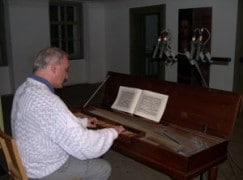Who taught the Chinese to love the piano? Not Lang Lang…
mainIt appears the first keyboard instrument was brought to China on January 24, 1601 by an Italian Jesuit missionary, Matteo Ricci. ‘Musical instruments are quite common and of many varieties,’ he noted, ‘but the use of the organ and the clavichord (pictured) is unknown, and the Chinese possess no instrument of the keyboard type.’
Fascinating article here by Sheila Melvin.






Comments